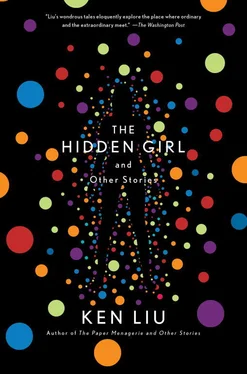The field house was festooned with orange streamers, plastic bats, and paper pumpkins. They put on their masks and went in. They danced to Paula Abdul’s “Straight Up” and then Madonna’s “Like a Prayer.” Well, Carrie danced; Fred mostly tried to keep up.
Though he still moved as awkwardly as ever, the masks somehow made it easier for him not to worry about his lack of the most essential skill for surviving an American high school—blending in.
The rubber masks soon made them sweaty. Carrie drank cup after cup of the sickly-sweet punch, but Fred, who opted to keep his mask on, shook his head. By the time Jordan Knight began to sing “I’ll Be Loving You (Forever),” they were ready to get out of the dark gym.
Outside, the parking lot was filled with ghosts, Supermans, aliens, witches, and princesses. They waved at the presidential couple, and the couple waved back. Fred kept his mask on and deliberately set a slow pace, enjoying the evening breeze.
“Wish it could be Halloween every day,” he said.
“Why?” she asked.
No one knows who I am, he wanted to say. No one stares at me. But instead all he said was “It’s nice to wear a suit.” He spoke carefully and slowly, and he almost could not hear his accent.
She nodded, as if she understood. They got into the car.
Until Fred’s arrival, East Norbury High School had never had a student whose first language wasn’t English and who might be illegal. People were mostly friendly, but a thousand smiles, whispers, little gestures that each individually seemed so innocuous added up to you don’t belong .
“You nervous about meeting my parents?” she asked.
“No,” he lied.
“My mom is really excited about meeting you.”
They arrived at a white raised ranch behind an immaculate lawn. The mailbox at the mouth of the driveway said “Wynne.”
“This is your house,” he said.
“You can read!” she teased, and parked.
Walking up the driveway, Fred could smell the sea in the air and hear the waves crashing against the shore nearby. There was an elegant, simple jack-o’-lantern on the steps before the front door.
A fairy tale house, Fred thought. An American castle.
•
“Is there anything I can do to help?” Fred asked from the kitchen door.
Mrs. Wynne (“Call me Cammy”) was shuttling between the kitchen table, which was being used as a cutting/mixing/staging station, and the stove. She smiled at him quickly before turning back to her work. “Don’t worry about it. Go chat with my husband and Carrie.”
“I really can help,” he said. “I know my way around a kitchen. My family runs a restaurant.”
“Oh, I know. Carrie tells me your Moo Shu Pork is excellent.” She stopped and looked at him, her smile even wider. “You speak such good English!”
He never understood why people felt it important to point that out. They always sounded so surprised, and he never knew what to say. “Thank you.”
“It really is very good. Go on now. I have this all under control.”
He retreated back to the living room, wishing he could stay in the warm, almost-familiar heat of the kitchen.
•
“A terrible thing,” Mr. Wynne said. “Those brave students in Tiananmen Square. Heroes.”
Fred nodded.
“Your parents,” Mr. Wynne continued, “they were dissidents?”
Fred hesitated. He remembered his father reading the Chinese newspaper they got for free from Chinatown up in Boston, showing the photographs of the protesting crowds in Beijing.
“Stupid kids,” he had said, contempt making his face red. “Wasting their parents’ money to riot outside like the Red Guards just so they can pose for the foreigners and their cameras instead of studying. What do they hope to accomplish? They’re all spoiled, read too many American books.”
Then he turned to Fred and shook his fist threateningly. “If you ever dare to do something like that, I’ll beat you until you can tell your ass apart from your head again.”
“Yes,” Fred said. “That’s why we came here.”
Mr. Wynne nodded, satisfied. “This is a great country, isn’t it?”
Truth be told, he had never really understood why, one day, his parents had woken him up in the middle of the night; why they had gotten on a boat, then a truck, then a bus, then a big ship; why, for so many days, they had ridden in the dark, the tossing and tumbling of the sea making him sick; why, after they landed, they had hidden in the back of a van until they emerged in the dirty streets of Chinatown in New York, where some men spoke with his father in menacing tones while he nodded and nodded; why his father had told him that now they all had different names and were different people and they must never talk to foreigners or the police; why they had all lived in the basement of a restaurant and worked there for years and talked endlessly of how to save money to pay off the debt to those menacing men and then make more of it; why they had then moved again, to East Norbury, this small town on the coast of New England, where his father said there were no Chinese restaurants and the Americans were too stupid to know that he wasn’t much of a cook.
“A great country, sir,” he said.
“And that’s the face of a great man you’re holding,” Mr. Wynne said, indicating his mask. “A real fighter for freedom.”
After that week in June, his father had gotten on the phone every evening, whispering deep into the night. And suddenly his father told him and his mother that they had to memorize a new story about themselves, about how they were connected to the students who had died in Tiananmen Square, believed the same things, and were hopelessly in love with “democracy.” “Asylum” was mentioned often, and they had to be prepared for an interview with some American official in New York next month, so that they could make themselves legal .
“Then we can stay here and make lots of money,” his father had said, satisfied.
The doorbell rang. Carrie got up with the bowl of candies.
“Carrie is always adventurous,” Mr. Wynne said. He lowered his voice. “She likes to try new things. It’s natural, being rebellious at her age.”
Fred nodded, not sure what he was really being told.
Mr. Wynne’s face lost its friendly expression, like a mask falling off. “She’s just going through a phase, you understand. You’re a part”—he waved his hands vaguely—“of… of how she wants to get a rise out of me.
“It’s not serious,” he added. But his expression was very serious.
Fred said nothing.
“I just want there to be no misunderstandings,” Mr Wynne continued. “People tend to belong with their own kind, as I’m sure you’ll agree.”
Over by the door, Carrie gasped and pretended to be scared by the trick-or-treaters and expressed admiration at the costumes.
“Don’t get the wrong idea about what she’s doing with you.”
Carrie returned from the door.
“Why so quiet?” she asked. “What were you two talking about?”
“Just learning about Fred’s family,” Mr. Wynne said, his face again friendly and smiling. “They were dissidents, did you know? Very brave people.”
Fred stood up, his hand in his pocket, fingers wrapped around the little bronze spade. He fantasized throwing it at the face of Mr. Wynne, which strangely bore some resemblance to his father’s.
But instead, he said, “I’m sorry. I didn’t realize it’s so late. I should go.”
1.
HONG KONG, 1905
“Jyu-zung—” William’s father called again. He was as loud as their neighbor futilely attempting to quiet her colicky child.
Читать дальше












